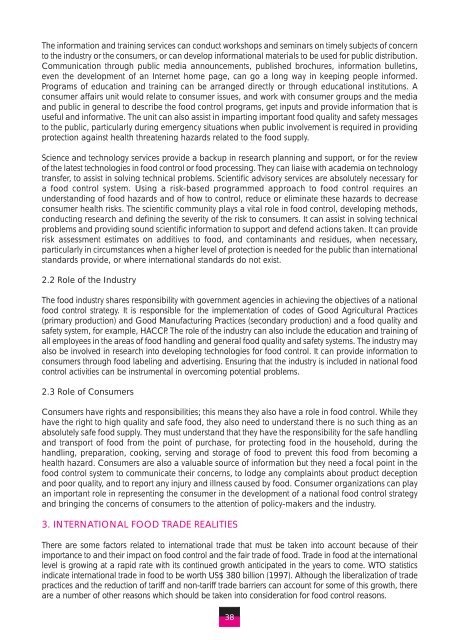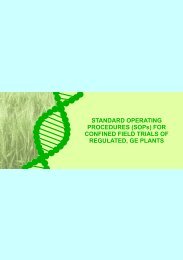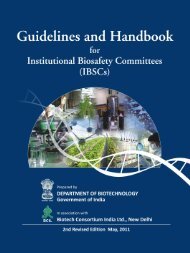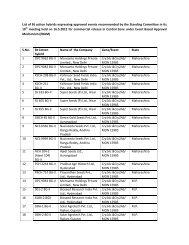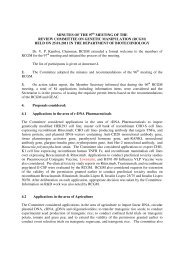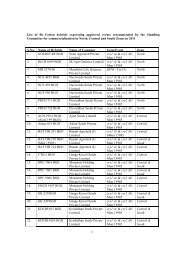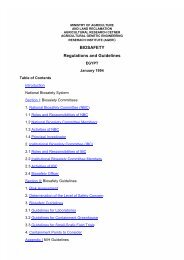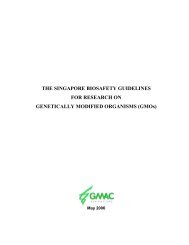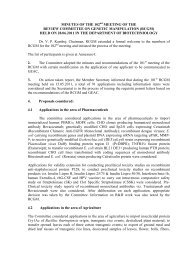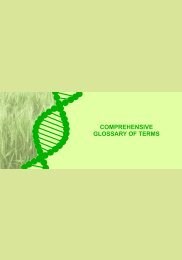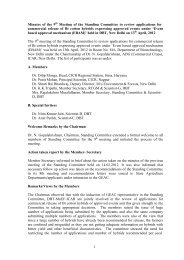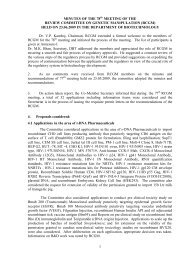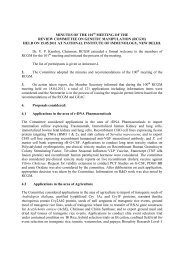THE USER'S MANUAL ON CODEX - Department of Biotechnology
THE USER'S MANUAL ON CODEX - Department of Biotechnology
THE USER'S MANUAL ON CODEX - Department of Biotechnology
Create successful ePaper yourself
Turn your PDF publications into a flip-book with our unique Google optimized e-Paper software.
The information and training services can conduct workshops and seminars on timely subjects <strong>of</strong> concern<br />
to the industry or the consumers, or can develop informational materials to be used for public distribution.<br />
Communication through public media announcements, published brochures, information bulletins,<br />
even the development <strong>of</strong> an Internet home page, can go a long way in keeping people informed.<br />
Programs <strong>of</strong> education and training can be arranged directly or through educational institutions. A<br />
consumer affairs unit would relate to consumer issues, and work with consumer groups and the media<br />
and public in general to describe the food control programs, get inputs and provide information that is<br />
useful and informative. The unit can also assist in imparting important food quality and safety messages<br />
to the public, particularly during emergency situations when public involvement is required in providing<br />
protection against health threatening hazards related to the food supply.<br />
Science and technology services provide a backup in research planning and support, or for the review<br />
<strong>of</strong> the latest technologies in food control or food processing. They can liaise with academia on technology<br />
transfer, to assist in solving technical problems. Scientific advisory services are absolutely necessary for<br />
a food control system. Using a risk-based programmed approach to food control requires an<br />
understanding <strong>of</strong> food hazards and <strong>of</strong> how to control, reduce or eliminate these hazards to decrease<br />
consumer health risks. The scientific community plays a vital role in food control, developing methods,<br />
conducting research and defining the severity <strong>of</strong> the risk to consumers. It can assist in solving technical<br />
problems and providing sound scientific information to support and defend actions taken. It can provide<br />
risk assessment estimates on additives to food, and contaminants and residues, when necessary,<br />
particularly in circumstances when a higher level <strong>of</strong> protection is needed for the public than international<br />
standards provide, or where international standards do not exist.<br />
2.2 Role <strong>of</strong> the Industry<br />
The food industry shares responsibility with government agencies in achieving the objectives <strong>of</strong> a national<br />
food control strategy. It is responsible for the implementation <strong>of</strong> codes <strong>of</strong> Good Agricultural Practices<br />
(primary production) and Good Manufacturing Practices (secondary production) and a food quality and<br />
safety system, for example, HACCP. The role <strong>of</strong> the industry can also include the education and training <strong>of</strong><br />
all employees in the areas <strong>of</strong> food handling and general food quality and safety systems. The industry may<br />
also be involved in research into developing technologies for food control. It can provide information to<br />
consumers through food labeling and advertising. Ensuring that the industry is included in national food<br />
control activities can be instrumental in overcoming potential problems.<br />
2.3 Role <strong>of</strong> Consumers<br />
Consumers have rights and responsibilities; this means they also have a role in food control. While they<br />
have the right to high quality and safe food, they also need to understand there is no such thing as an<br />
absolutely safe food supply. They must understand that they have the responsibility for the safe handling<br />
and transport <strong>of</strong> food from the point <strong>of</strong> purchase, for protecting food in the household, during the<br />
handling, preparation, cooking, serving and storage <strong>of</strong> food to prevent this food from becoming a<br />
health hazard. Consumers are also a valuable source <strong>of</strong> information but they need a focal point in the<br />
food control system to communicate their concerns, to lodge any complaints about product deception<br />
and poor quality, and to report any injury and illness caused by food. Consumer organizations can play<br />
an important role in representing the consumer in the development <strong>of</strong> a national food control strategy<br />
and bringing the concerns <strong>of</strong> consumers to the attention <strong>of</strong> policy-makers and the industry.<br />
3. INTERNATI<strong>ON</strong>AL FOOD TRADE REALITIES<br />
There are some factors related to international trade that must be taken into account because <strong>of</strong> their<br />
importance to and their impact on food control and the fair trade <strong>of</strong> food. Trade in food at the international<br />
level is growing at a rapid rate with its continued growth anticipated in the years to come. WTO statistics<br />
indicate international trade in food to be worth US$ 380 billion (1997). Although the liberalization <strong>of</strong> trade<br />
practices and the reduction <strong>of</strong> tariff and non-tariff trade barriers can account for some <strong>of</strong> this growth, there<br />
are a number <strong>of</strong> other reasons which should be taken into consideration for food control reasons.<br />
38


